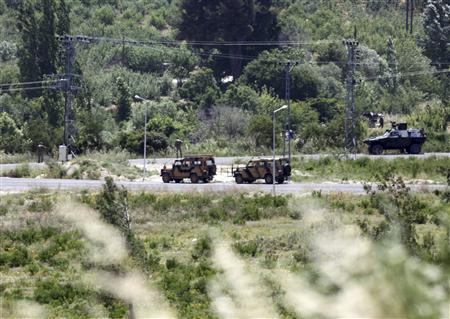Twin bombs exploded outside the Palace of Justice in Damascus on Thursday as deadly violence raged across the country and Turkey reinforced its volatile border with Syria with missile batteries.
Ankara’s move came as world powers prepared for a crucial meeting on ways to end the raging conflict in Syria and to discuss a plan by peace envoy Kofi Annan for an interim government.
The meeting in Geneva, agreed only after wrangling between Moscow and Washington over the agenda and the guest list, will be attended by some regional governments but not by rival Middle East heavyweights Iran and Saudi Arabia.
According to a copy of his transition plan obtained by AFP, Annan will demand “irreversible” steps by President Bashar al-Assad and the Syrian opposition to end the conflict.
A blueprint for multi-party elections and an offer for “significant” international funding to rebuild Syria will also be discussed.
Russia has already poured cold water on the Geneva gathering, with Foreign Minister Sergei Lavrov saying Moscow rejects Western pressure for Assad’s ouster.
In central Damascus, three people were wounded when bombs blasted a car park outside the court complex, state media reported. A police source told AFP that two magnetic bombs exploded in judges’ cars.
US State Department spokeswoman Victoria Nuland said Washington condemned attacks “against innocents from any direction that they come from” after the bombings.
“But the larger concern is — as we’ve said for many, many weeks — it is Assad that bears the brunt of responsibility,” she told reporters.
Assad said in an interview on Iranian state television recorded a week ago and broadcast on Thursday that he believed Western and some regional countries were playing a role in supporting the uprising.
He acknowledged that “material proof does not exist” because “most of the time their support is hidden and indirect,” but “their relations (with the armed opposition) are clear.”
Elsewhere on Thursday, violence killed at least 91 people, including 59 civilians, after one of the bloodiest days of the 15-month revolt left at least 149 dead on Wednesday, a watchdog said.
Thursday’s heaviest toll was in the northern Damascus suburb of Douma where 30 people were killed, among them five members of one family, said the Syrian Observatory for Human Rights.
The day’s death toll also included 23 soldiers and nine rebels, said the watchdog, adding that that regime forces backed by helicopters pounded several areas of the eastern city of Deir Ezzor.
More than 15,800 people have been killed since the uprising broke out in March 2011, including nearly 4,700 since April 12, when a UN-backed ceasefire was supposed to have taken effect, the Observatory says.
Turkey has sent missile batteries, tanks and troops to the border as a “security corridor” after Syria shot down a Turkish warplane last Friday, media reports said.
State-run TRT television showed dozens of military vehicles reportedly heading for the border, in a convoy that included air defence systems.
About 30 military vehicles accompanied by a truck towing missile batteries left a base in the southeastern province of Hatay for the border, about 50 kilometres (30 miles) away, Milliyet newspaper reported.
The Turkish Phantom F-4 jet was downed by Syria over the eastern Mediterranean in what Prime Minister Recep Tayyip Erdogan called a “heinous attack” over international waters.
Turkey’s National Security Council said after a meeting on Thursday it will take steps “with determination by reserving all of its rights born out of international law in the face of this hostile act.”
Diplomats at the United Nations said on Wednesday that Annan is proposing setting up a transitional government to include representatives of both sides in the Syria conflict.
The proposed interim authority would exclude officials whose presence might jeopardise the transition “or undermine efforts to bring reconciliation,” according to a summary given by one UN diplomat.
“The language of Annan’s plan suggests that Assad could be excluded but also that certain opposition figures could be ruled out,” said another UN diplomat.
US officials had warned that US Secretary of State Hillary Clinton could stay away from the conference if transition from Assad’s rule was not on the agenda.
Russia also insists Iran should be part of the solution to Syria’s conflict.
“Iran is an influential player in this situation and to leave it out of the Geneva meeting, I believe, is a mistake,” Lavrov said on Thursday.
Assad’s fate “must be decided within the framework of a Syrian dialogue by the Syrian people themselves” without foreign interference, he insisted.
Clinton, who will meet Lavrov in Saint Petersburg on Friday, rejected any idea that Annan was proposing a transition imposed from outside.
“In his transition document it is a Syrian-led transition, but you have to have a transition that complies with international standards on human rights, accountable governance, the rule of law,” she said.
The opposition Syrian National Council said it would boycott any government if Assad stays, while Syria’s Muslim Brotherhood, an SNC member, said forming a unity government as violence continues “would be to delude ourselves and play the regime’s game.”









